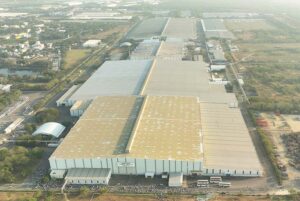Renault Nissan Automotive Pvt Ltd (RNAIPL) has declared that it will be crossing several important sustainability milestones by the year 2030.
 RNAIPL’s carbon neutrality roadmap encompasses three key pathways: Increasing the share of green energy in the overall mix, aggressively improving efficiencies in energy usage and continuous adoption of energy efficient technology at its Oragadam, plant.
RNAIPL’s carbon neutrality roadmap encompasses three key pathways: Increasing the share of green energy in the overall mix, aggressively improving efficiencies in energy usage and continuous adoption of energy efficient technology at its Oragadam, plant.
The strategy has already allowed the automaker to cut down the equivalent of 87,500 tons of CO2 emissions every year as of FY 2022-23.
Keerthi Prakash, Managing Director of RNAIPL, commented: “At RNAIPL, our unwavering commitment to environmental responsibility is imprinted in everything we do. We have set ourselves on an ambitious roadmap to Carbon Neutrality by 2045 and this goal underlies our drive towards utilization of more green energy, optimization of energy consumption and upgrading our technology. RNAIPL is a leader in energy efficiency and sustainability actions within the global network of manufacturing facilities within the Renault Nissan Alliance and we aim to further consolidate this position not only within the Alliance, but also within the industry.
“RNAIPL is also committed to shaping a more sustainable future for our communities and a number of our Corporate Social Responsibility programmes work towards this goal, including our ambitious project to rejuvenate water bodies. We are shaping a future where our actions today define the legacy we leave for generations to come,” he further added.
RNAIPL currently sources close to 60% of its electricity from renewable sources such as solar, biomass and wind. Taking its clean energy commitment further, the plant will expand its in-house solar plant capacity from 2.2MW to 14MW through additional installation of rooftop solar panels and innovative floating solar panels on the plant’s pond by 2026. By leveraging renewable energy sources, RNAIPL is working towards meeting 85% of the plant’s energy needs with renewable power by 2030, and transition to 100% renewable energy by 2045.
Already acknowledged as the plant that is least dependent on external water sources in the global Renault Nissan Alliance thanks to its rainwater harvesting and water recycling infrastructure, RNAIPL is set to become water-positive by 2030. RNAIPL currently meets 85% of its total water needs from its rainwater harvesting ponds developed within the premises.
The plant is also a Zero Discharge plant, recycling and reusing wastewater for industrial process and a variety of uses including gardening. RNAIPL plans to further enhance water efficiency through upgraded plumbing designs, water audits, and stringent monitoring, and is targeting a 21% reduction in water use by 2030 as compared to FY 2022-23 levels.
Within the community, in addition to the 10 lakes and ponds that it has already committed to rejuvenate, RNAIPL will further explore opportunities to create new water bodies and will also build direct groundwater recharging pits to improve water tables in what is a water stressed region. Supplemented with its tree planting initiatives, these actions will enable RNAIPL to facilitate return of more water into the environment than it consumes for its operations, becoming water positive by 2030.
Over the last few years, RNAIPL has already been working on a set of initiatives to replace single use plastic items from within the plant with eco-friendly alternatives as per norms laid out by the government.
The company also conducts regular employee campaigns to increase awareness on the drawbacks and environmental harm caused by use of single use plastic.
By 2030, the plant aims to reduce the amount of energy required to manufacture a car by 20% (as compared to 2019 energy baseline) and reduce this further by 30% by 2045.
